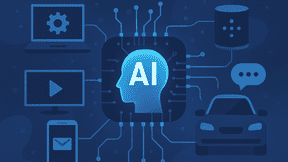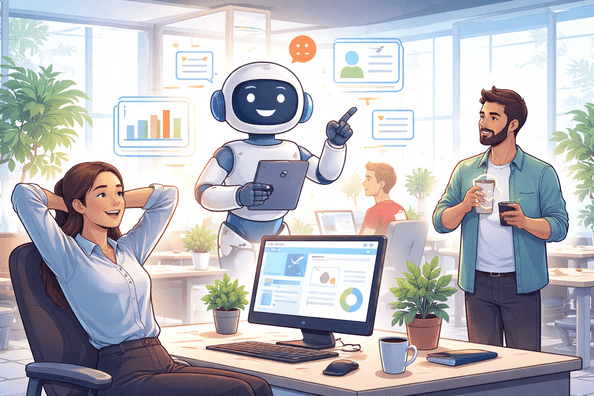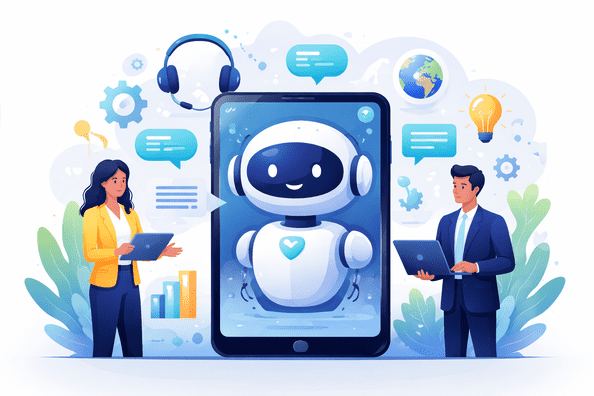Artificial Intelligence (AI) is no longer a futuristic concept confined to sci-fi movies or high-tech labs. It’s woven into the fabric of our daily lives, often in ways we don’t immediately recognize. IBM, a pioneer in AI technology, has been quietly embedding its AI solutions into many everyday tools and systems that millions of people use-without even realizing it.
From healthcare to banking, retail to supply chains, IBM’s AI is the invisible engine driving smarter, faster, and more personalized experiences. In this post, we’ll explore how IBM AI is used in real life, uncover the hidden uses of IBM artificial intelligence, and share IBM Watson real world examples that demonstrate the profound impact of this technology. We’ll also highlight IBM AI in everyday technology and reveal some little known applications of IBM artificial intelligence that might surprise you.
So, buckle up for a deep dive into the quiet revolution powered by IBM AI that touches your life every day.
Introduction: The Invisible Power of IBM AI
When you think of AI, your mind might jump to robots, self-driving cars, or voice assistants like Siri and Alexa. But AI is much more than flashy gadgets. It’s a set of technologies that analyze data, learn patterns, and make decisions to improve processes and experiences. IBM has been at the forefront of this AI evolution for decades, starting with its Watson supercomputer famously beating human champions on Jeopardy! in 2011.
Since then, IBM has expanded AI into practical, everyday tools-often hidden behind the scenes. Whether it’s helping doctors diagnose diseases, enabling banks to detect fraud instantly, or optimizing supply chains globally, IBM’s AI quietly powers systems that millions rely on daily.
This blog post will:
- Explain how IBM AI is used in real life across industries
- Reveal the hidden uses of IBM artificial intelligence you might not know about
- Highlight IBM Watson real world examples that showcase AI’s impact
- Discuss IBM AI in everyday technology that touches consumers
- Share little known applications of IBM artificial intelligence that demonstrate innovation
Let’s explore these fascinating AI applications that are changing the world quietly but powerfully.
1. IBM AI in Healthcare: The Silent Doctor
Healthcare is one of the most critical areas where IBM AI is making a difference. The complexity of medical data, the need for personalized treatment, and the pressure on healthcare workers make AI an ideal partner.
IBM Watson for Oncology and Beyond
IBM Watson for Oncology is a prime example of AI assisting doctors. It analyzes vast medical literature, patient records, and clinical trials to suggest personalized cancer treatments. This isn’t about replacing doctors but augmenting their expertise. Imagine a tireless assistant who has read every medical journal and can instantly cross-reference your case with global data.
For instance, in India, where access to specialized cancer care can be limited, Watson helps oncologists recommend treatments aligned with global best practices. This democratizes healthcare, bringing expert insights to remote areas.
Automating Clinical Documentation
Doctors spend nearly half their time on paperwork. IBM’s AI-powered tools use natural language processing (NLP) to transcribe doctor-patient conversations, automatically generate clinical notes, and highlight critical information. This reduces burnout and allows doctors to focus more on patient care.
Predictive Analytics for Patient Monitoring
IBM AI systems analyze real-time patient data from monitors and wearables to predict health deterioration before it happens. For example, in intensive care units (ICUs), AI can alert staff about early signs of sepsis or respiratory failure, enabling timely intervention.
Key points about IBM AI in healthcare:
- Personalizes treatment recommendations using vast medical data
- Automates clinical documentation to reduce physician workload
- Predicts patient health risks in real time for proactive care
- Democratizes access to expert medical knowledge worldwide
2. Banking and Finance: The Fraud-Fighting AI
Financial institutions handle millions of transactions daily, making security and efficiency top priorities. IBM AI is deeply embedded in banking systems to detect fraud, personalize services, and streamline operations.
Real-Time Fraud Detection on IBM Z Systems
IBM’s AI models run on IBM Z mainframes, analyzing transaction data in milliseconds to detect suspicious activity. This real-time fraud detection is like having a vigilant detective watching every transaction instantly. For example, if your credit card is used in two countries within minutes, the system flags it immediately, preventing unauthorized charges.
Personalized Financial Advice
Beyond security, IBM AI helps banks offer personalized financial products. By analyzing spending habits and goals, AI can suggest savings plans, investment opportunities, or credit options tailored to individual customers. Imagine a financial advisor who knows your habits and goals intimately and offers advice proactively.
Automating Compliance and Risk Management
Regulatory compliance is complex and costly. IBM AI automates the review of transactions and documents to identify risks and ensure compliance with regulations, reducing human error and operational costs.
Key points about IBM AI in banking:
- Detects fraud in real time, preventing losses
- Personalizes financial advice based on customer data
- Automates compliance checks and risk assessments
- Runs efficiently on secure IBM Z mainframes
3. Retail and Customer Service: Smarter Shopping Experiences
Retailers face the challenge of delivering personalized, seamless experiences to customers across channels. IBM AI helps brands meet these expectations by powering chatbots, demand forecasting, and customer insights.
Watson Assistant: The AI Customer Service Agent
Companies like Camping World and Vodafone use IBM’s watsonx Assistant to handle customer queries 24/7. This AI assistant understands natural language, learns from interactions, and can escalate complex issues to human agents. For example, Camping World saw a 40% increase in customer engagement and a 33% boost in agent productivity after implementing Watson Assistant.
Demand Forecasting and Inventory Optimization
IBM AI analyzes sales data, weather forecasts, social media trends, and even geopolitical events to predict demand. Vodafone uses watsonx.ai to simulate thousands of conversational scenarios, reducing testing times for customer service workflows from 6.5 hours to under a minute. This helps retailers stock the right products at the right time, reducing waste and improving customer satisfaction.
Personalized Marketing and Recommendations
AI models analyze customer preferences and behavior to deliver personalized offers and product recommendations. This increases conversion rates and customer loyalty.
Key points about IBM AI in retail:
- Powers intelligent chatbots for 24/7 customer service
- Forecasts demand using diverse data sources
- Optimizes inventory and supply chain decisions
- Enables personalized marketing and product recommendations
4. Supply Chain and Logistics: The Nervous System of Commerce
Global supply chains are complex and fragile. IBM AI acts as the nervous system, detecting disruptions, optimizing routes, and improving responsiveness.
Watson Supply Chain Insights
IBM’s Watson Supply Chain Insights uses AI to analyze data from suppliers, logistics providers, weather reports, and news feeds to predict disruptions. During the 2021 Suez Canal blockage, companies using Watson adjusted their supply routes days before others, minimizing delays and losses.
Route Optimization and Cost Savings
AI optimizes delivery routes by factoring in traffic, weather, fuel costs, and delivery windows. For example, logistics managers receive alerts like: “Shipment #45A will be delayed by 3 hours due to typhoon; rerouting via Singapore saves $12,000.” This dynamic decision-making saves money and improves customer satisfaction.
Inventory Management and Demand Planning
AI models forecast demand fluctuations and suggest inventory adjustments, reducing stockouts and excess inventory. This is crucial for perishable goods and fast-moving consumer products.
Key points about IBM AI in supply chains:
- Predicts disruptions using diverse real-time data
- Optimizes delivery routes for cost and speed
- Improves inventory management and demand forecasting
- Enhances supply chain resilience and agility
5. Everyday Technology: The Hidden Genius in Your Pocket and Home
Many consumers don’t realize IBM AI powers features in their smartphones, smart homes, and even data centers.
AI in Smartphones and Apps
While Apple and Google get credit for smartphone AI, IBM contributes foundational technologies. For example, the IBM Watson Tone Analyzer helps apps like Slack detect emotional tone in messages, nudging users to adjust wording for better communication. Your phone’s camera might use IBM AI patents for computational photography, improving low-light shots and image clarity.
Smart Homes and IoT Devices
IBM AI integrates with Internet of Things (IoT) devices to make homes smarter. AI can learn your habits and adjust lighting, temperature, and security systems automatically. For example, IBM’s AI-powered assistants can predict when you’ll arrive home and prepare your environment accordingly.
Data Center Robotics
IBM repurposed iRobot Create robots (similar to Roombas) to patrol data centers, monitoring temperature and humidity. These AI-powered robots prevent server failures by detecting environmental anomalies early, reducing downtime and energy costs.
Key points about IBM AI in everyday tech:
- Enhances smartphone apps with emotional and image analysis
- Powers smart home automation and predictive adjustments
- Uses robotics to maintain data center environments
- Improves user experience in subtle, behind-the-scenes ways
6. The Evolution of IBM AI: From Research to Real-World Impact
IBM has a rich history of AI innovation, starting with early expert systems and progressing to today’s advanced machine learning and large language models (LLMs).
Early AI and Expert Systems
IBM’s early AI focused on expert systems that encoded human knowledge into rules. These systems were used in medical diagnosis, financial analysis, and more.
Watson and Cognitive Computing
The breakthrough came with Watson, which combined natural language processing, machine learning, and information retrieval to understand and answer complex questions. Watson’s victory on Jeopardy! in 2011 showcased this capability.
Modern AI: LLMs and Generative AI
Today, IBM is developing large language models (LLMs) and generative AI under the watsonx.ai platform. These models can generate text, simulate conversations, and automate workflows, enabling new applications across industries.
Table: Summary of IBM AI Applications Across Industries
| Industry | IBM AI Application | Key Benefits | Real-World Example |
| Healthcare | Watson for Oncology, Clinical NLP | Personalized treatment, reduced paperwork | Cancer treatment recommendations in India |
| Banking & Finance | Real-time fraud detection, AI advisors | Fraud prevention, personalized financial advice | Fraud detection on IBM Z mainframes |
| Retail | Watson Assistant, Demand Forecasting | Improved customer service, inventory optimization | Camping World chatbot, Vodafone demand forecasting |
| Supply Chain | Watson Supply Chain Insights | Disruption prediction, route optimization | Suez Canal blockage response |
| Consumer Tech | Tone Analyzer, Smart Home AI | Enhanced communication, home automation | Slack tone detection, iRobot data center patrols |
| Research & Development | Expert systems to LLMs | Advanced AI capabilities, workflow automation | Watson on Jeopardy!, watsonx.ai platform |
7. Little Known Applications of IBM Artificial Intelligence
Beyond the well-known examples, IBM AI powers some unexpected and fascinating applications:
AI-Driven Environmental Monitoring
IBM AI analyzes satellite imagery and sensor data to monitor deforestation, water quality, and climate change impacts. This helps governments and NGOs make informed decisions to protect the environment.
AI in Legal Services
IBM Watson assists law firms by reviewing contracts, identifying risks, and suggesting clauses. This speeds up legal review and reduces errors.
AI for Education
IBM AI personalizes learning by analyzing student progress and adapting content to individual needs, making education more effective and engaging.
AI in Art and Creativity
IBM collaborates with artists to create AI-generated music, paintings, and poetry, exploring the intersection of technology and creativity.
Conclusion: The Quiet Revolution of IBM AI
IBM’s artificial intelligence is a quiet but powerful force shaping the tools and systems we rely on every day. From healthcare breakthroughs to fraud detection, from smarter shopping to resilient supply chains, IBM AI is embedded deeply in the fabric of modern life.
The next time you enjoy a seamless online shopping experience, receive personalized financial advice, or benefit from timely medical care, remember that behind the scenes, IBM’s AI technologies are working tirelessly to make these moments possible.
AI’s most profound impact often happens quietly, in the background, enhancing our world without fanfare. IBM’s commitment to responsible, innovative AI ensures that this quiet revolution continues to improve lives globally-one intelligent solution at a time.



